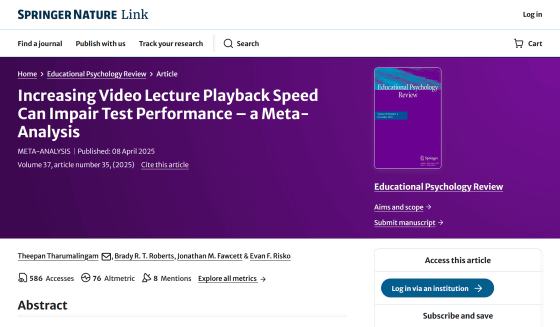Research shows that watching online lectures at double speed can negatively affect test scores

In recent years, the younger generation has become accustomed to watching online lecture videos, podcasts, audiobooks, etc. at a faster speed than usual. For example,
Increasing Video Lecture Playback Speed Can Impair Test Performance – a Meta-Analysis | Educational Psychology Review
https://link.springer.com/article/10.1007/s10648-025-10003-9

What happens to your brain when you watch videos online at faster speeds than normal
https://theconversation.com/what-happens-to-your-brain-when-you-watch-videos-online-at-faster-speeds-than-normal-259930
The benefits of watching videos online at high speed, not just lecture videos, include being able to watch more content in the same amount of time, being able to enjoy watching content repeatedly, and being able to reduce the time it takes to finish watching, preventing you from losing concentration midway through.
'Speed-up video viewing may be particularly useful in educational contexts, allowing more time for knowledge retention or mock exams,' said Marcus Pearce , a cognitive scientist at Queen Mary University of London , who was not involved in the research. 'Quick viewing may also help maintain focus and energy, and prevent the mind from wandering.'
However, it is said that watching videos at high speed may have a disadvantage in terms of 'memory formation'. Researchers believe that there are three stages in which people memorize information: '1: encoding', '2: retention', and '3: recall'. In the case of audio information, the encoding stage takes a certain amount of time to process and understand the sound that is heard. In order to utilize memory, it is necessary to extract and store important words and recall their meaning including context in real time when needed.

The average human speaks at about 150 words per minute, and it has been shown that even if that rate increases to 300-450 words per minute, it
It is said that information that enters the human brain is temporarily stored in working memory and then organized so that it can be transferred to long-term memory, but working memory has a limited capacity. Therefore, if too much information comes in at once, it can exceed the upper limit of working memory, which can lead to increased cognitive overload and information loss, Pierce points out.
To answer these questions, a new study analyzed the results of 24 studies on learning from watching lecture videos. The designs of these experiments varied, but most involved one group watching lecture videos at normal speed (1x) and the other group watching them at a faster speed (1.25x, 1.5x, 2x, or 2.5x), and then taking a test on the content of the lecture videos after watching them.
A meta-analysis of the studies showed that increasing the playback speed of lecture videos worsened test performance, with the effect being minor up to 1.5x speed, but a moderate to large detrimental effect at 2x speed or faster.
For example, if a group of students had an average correct answer rate of 75% that varied by 20 percentage points above and below that rate, then when the playback speed was increased to 1.5 times faster, the average student's score dropped by 2 percentage points. When the playback speed was increased to 2.5 times faster, students' scores dropped by an average of 17 percentage points.

One study included in this meta-analysis showed that older adults aged 61 to 94 years were more adversely affected by high-speed viewing than younger adults aged 18 to 36 years. This may reflect age-related decline in memory, and suggests that older adults may need to view content at the same speed as normal or slightly slower to compensate for this decline in memory.
It's also possible that people who regularly watch high-speed content may have brain adaptations that reduce the negative effects of high-speed viewing, but this is not yet known.
It is also unclear whether high-speed video viewing has long-term effects on mental function and brain activity. For example, while continued high-speed video viewing may have positive effects, such as developing adaptability to increased cognitive load, it may also have negative effects, such as increasing mental fatigue due to increased cognitive load. However, at the time of writing, there is a lack of scientific evidence to answer this question.
Finally, Pierce points out that even if watching something at 1.5x speed doesn't affect memory or test results, there's evidence that it makes the experience less enjoyable . 'This may affect people's motivation to learn and their experience, leading them to look for reasons not to do it,' Pierce said. 'On the other hand, because high-speed playback is gaining popularity, it may not be a problem once people get used to it. Hopefully, we'll be able to understand these processes better in the next few years,' Pierce said.
Related Posts:
in Science, Free Member, Posted by log1h_ik







